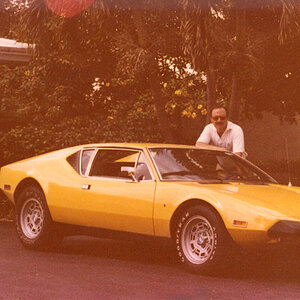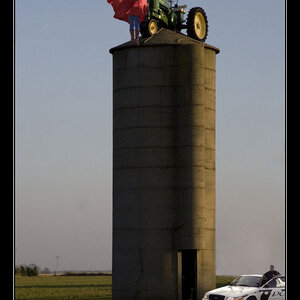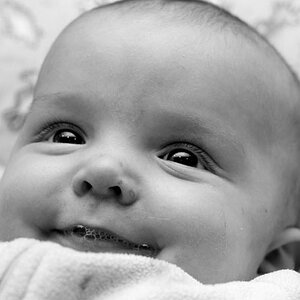jamiebonline
TPF Noob!
- Joined
- Aug 14, 2013
- Messages
- 122
- Reaction score
- 21
- Location
- Ireland
- Can others edit my Photos
- Photos OK to edit
Hi,
I was looking on flickr the other day under 35mm prime lenses. I decided to see if I could tell which pictures were from a much higher resolution more recent apsc camera like the D7200 and which were from an older camera with an inferior sensor and lower pixel count. My laptop is, I would say, average size. Well my results are this: I could see no difference at all! I totally failed to tell which pictures were from the more advanced models and which were from a camera from 8 years ago. I'd suggest you give it a try. It's kind of interesting to say the least. I don't think my eyes are that bad either. See for yourself anyway.
I know there are a lot of posts where people go on and on about IQ and sharpness but in practical terms... it's often a different story.
Now there is a lot more to a camera than IQ. For example, number of focus points, more frames per second and so on. Many other things which make the process of getting the image somewhat easier. I am only talking about IQ here. The further back you go the more limited the machine and yet iconic sports images happened on cameras which were almost laughably slow compared to today's.
Back to where I started, I searched for images taken by the D90 and didn't specify the lens and apart from some obvious macro work or really wide aperture shots, sometimes I couldn't tell if a lens was a 50 1.4, for example or kit lens at 50mm. I was really surprised by some kit lens pictures.
One would need to see the images side by side, I guess and I am sure getting the original file and analysing it would show big differences... but who the hell does that? Do we zoom in and analyze great paintings from the past? Well some people do but 99.999 per cent of the viewing public don't and that is who it is for, no? Some people here might say it is for themselves and so be it. I personally don't think of creative stuff this way. I am again thinking about the audience. So used to smart phones as so many people are now, I myself have been surprised by the good use of an iphone for a picture, it further shows the vast gap between art and consumer-driven tech.
Of course the companies want you to get the latest model and there is nothing wrong with that, if you like that but a great picture clearly defies the tool used. Why not go back to an old TLR from the film days which has so little to it compared to all the bells and whistles in newer cameras. Aren't there TLR images that are masterpieces? Superior in every way to a picture taken with a D5, for example? Of course there are.
So I am offering something most here already know, especially the more experienced among you, that the tools you use are far less important than you think. That the gear acquisition thing is often a total waste of money. I am reminded of music, which I know quite a lot about, a factory made guitar worth 100 bucks played by a great player is obviously ten times better than a 10,000 dollar guitar played poorly. It just needs to be said again though. It needs to be brought to the surface so people who are new to photography don't get lost and lose tons of cash trying to have the latest, falling for the gimmicks and not concentrating on the art.
I was looking on flickr the other day under 35mm prime lenses. I decided to see if I could tell which pictures were from a much higher resolution more recent apsc camera like the D7200 and which were from an older camera with an inferior sensor and lower pixel count. My laptop is, I would say, average size. Well my results are this: I could see no difference at all! I totally failed to tell which pictures were from the more advanced models and which were from a camera from 8 years ago. I'd suggest you give it a try. It's kind of interesting to say the least. I don't think my eyes are that bad either. See for yourself anyway.
I know there are a lot of posts where people go on and on about IQ and sharpness but in practical terms... it's often a different story.
Now there is a lot more to a camera than IQ. For example, number of focus points, more frames per second and so on. Many other things which make the process of getting the image somewhat easier. I am only talking about IQ here. The further back you go the more limited the machine and yet iconic sports images happened on cameras which were almost laughably slow compared to today's.
Back to where I started, I searched for images taken by the D90 and didn't specify the lens and apart from some obvious macro work or really wide aperture shots, sometimes I couldn't tell if a lens was a 50 1.4, for example or kit lens at 50mm. I was really surprised by some kit lens pictures.
One would need to see the images side by side, I guess and I am sure getting the original file and analysing it would show big differences... but who the hell does that? Do we zoom in and analyze great paintings from the past? Well some people do but 99.999 per cent of the viewing public don't and that is who it is for, no? Some people here might say it is for themselves and so be it. I personally don't think of creative stuff this way. I am again thinking about the audience. So used to smart phones as so many people are now, I myself have been surprised by the good use of an iphone for a picture, it further shows the vast gap between art and consumer-driven tech.
Of course the companies want you to get the latest model and there is nothing wrong with that, if you like that but a great picture clearly defies the tool used. Why not go back to an old TLR from the film days which has so little to it compared to all the bells and whistles in newer cameras. Aren't there TLR images that are masterpieces? Superior in every way to a picture taken with a D5, for example? Of course there are.
So I am offering something most here already know, especially the more experienced among you, that the tools you use are far less important than you think. That the gear acquisition thing is often a total waste of money. I am reminded of music, which I know quite a lot about, a factory made guitar worth 100 bucks played by a great player is obviously ten times better than a 10,000 dollar guitar played poorly. It just needs to be said again though. It needs to be brought to the surface so people who are new to photography don't get lost and lose tons of cash trying to have the latest, falling for the gimmicks and not concentrating on the art.



![[No title]](/data/xfmg/thumbnail/40/40286-86401b94de8b01bea8bb4ea154aaea0a.jpg?1619739408)
![[No title]](/data/xfmg/thumbnail/42/42464-98a778e864f4e6df2a9cc673b7549322.jpg?1619740192)

![[No title]](/data/xfmg/thumbnail/40/40287-4f839095000f74d779b90ed75df9dc62.jpg?1619739408)


![[No title]](/data/xfmg/thumbnail/40/40284-f59f6230f0d5b9eacf977f8b0392f087.jpg?1619739407)




